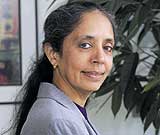|
Radha Ramaswami Basu is a bundle of energy as she flits from one engagement to another, despite the hot Indian summer and the fact that she is far away from her home near San Francisco, California. She has to attend to umpteen chores, including visits to villages, related to the Anudip Foundation for social welfare, a nonprofit organization based in Kolkata, which she set up with her engineer husband, Dipak Basu, in 2006. Anudip aims to provide work and entrepreneurship training to the marginalized rural poor of West Bengal.
Anudip: the name seems a little unusual. “Frankly, the name was decided at the spur of the moment as we went for registration, conjoining the first letters of our names. We hadn’t thought about a name yet. Happily, it has a meaning, too, as most Bengali names do,” says Basu, whose maiden name was Anuradha. It means micro-light “if translated from the two Bengali words, anu=atom, dip=light.” Anudip was born out of a realization that “we could use our skill to train people in the hinterland who often migrate to metros in search of livelihood,” she adds.
|

|
“We decided it was not charity—providing monetary help—that we wanted to do. We believe in social enterprise, to make people secure through financial stability.” |
And skill and experience Basu has aplenty. The student who had to convince her traditional parents in Chennai to let her go for a masters degree in electrical engineering and computer science at the University of Southern California in Los Angeles in 1973 ended up becoming the general manager of Hewlett-Packard’s International Software Organization in 1989, overseeingeight offshore software centers around the world. Earlier, she had set up the company’s office in India, building it up from scratch and earning many accolades for her work and entrepreneurship.
Basu’s resourcefulness was in evidence even when she was a student. “When I arrived in the U.S., I had little money for food, so I started scanning the university bulletins and found that every day there was a launch or orientation program at a department in the huge university, and they always had food! So I made a list of those I wanted to attend. Besides, I also came to know many people and developed my communication skills,” she recalls with a twinkle in her eyes. This stood her in good stead later when she became a leader in the student community and her “confession” about her food-scamming habits in the student bulletin even won her admirers. “We could do that, too,” many said.
Basu also had the guts to leave her cushy job and start her own company, SupportSoft, which provides support automation software, in 1998. The company has since been renamed Support.com. Then the chairman and CEO felt the need to do something more—to do something for the less fortunate.
Strangely, or perhaps providentially, that moment came during long mountain hikes. “Both I and my husband enjoy trekking and have been taking every opportunity to be out—whether to Peru, the Himalayas or the Himachal region.” She finds trekking involves three elements: it expands your vision—a realization of one’s “own small place in the universe, an experience almost spiritual;” it is inspiring—to strive to do something worthwhile; and it builds resilience. “You’re on your own. There’s a goal to reach and your confidence grows.”
On one such trip Basu observed the sherpas, the people who carry equipment for trekkers. “How patient they were! Despite the hardship they always had a smile on their faces and were ever ready to help others.” Basu realized she wanted to expand her horizon. She and her husband put their heads together, studied the problems and found that it was unemployment that troubled the rural population in West Bengal. “When we made a survey, we found what they most wanted was work and to be self-sufficient.”
“We decided it was not charity—providing monetary help—that we wanted to do. We believe in social enterprise, to make people secure through financial stability,” Basu emphasizes. She believes real empowerment comes from skill-building, which leads to sustainable living through a process of “learn and earn.”
Anudip links up with community NGOs for partnerships, after a rigorous selection process. There are 22 such centers across West Bengal. “I spend approximately four months in the year in India; it will probably increase to six months in coming years. This is because Anudip is growing significantly and starting to have substantive social impact,” says Basu.
—Courtesy SPAN
|